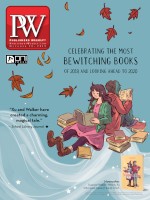Rivka Sass is the director and CEO of the Sacramento Public Library in Sacramento, Calif., and was a presenter at the Sharjah International Library Conference in 2017. This experience, which introduced her to the region, has led her to an intense engagement with the Za’atari refugee camp in Jordan, the world’s largest settlement camp for Syrian refugees. “I’ve been there three times and plan to go again,” Sass says. “As you can imagine, the challenges there are immense.”
Sacramento has a reputation for being one of the most integrated and diverse cities in the U.S.; initially it attracted a large population of Persians from Iran, and, more recently, it has become home to the largest population of Afghani immigrants in the U.S. Accordingly, Sass has a great deal of experience working with a variety of cultures. “We have a lot of Persians who speak Farsi,” she says. “They came over around the Iranian revolution, and now we have a fairly large population of people from Afghanistan. We are a microcosm of people everywhere.”
Sass says that the biggest challenge for serving such communities is getting the right books, which is where her visit to Sharjah gave her a new perspective. “Going to Sharjah and seeing the availability and the quality of books in Arabic, and having the chance to get immersed in what publishing is like there, was eye-opening,” she says. The awareness that there are books available that her patrons want, but that she cannot get, is frustrating.
At the book fair, Sass went shopping for her library. Her big find: sets of play blocks with the Arabic alphabet printed on them. “We do a lot of outreach to a lot of low-income people and refugees, and they really appreciate these blocks in particular,” she says. “We’ve actually looked at becoming a distributor for these and perhaps for some of the Arabic-language books that I found in the U.A.E. I know there are communities elsewhere in the United States who could use these books, for new arrivals, immigrants, refugees and families who want to teach their children to read in their native language.”
Acquiring and providing access to the right books is a challenge that all librarians face, whether they’re in the U.S., the U.A.E., or Jordan. At Za’atari, there are 12 makeshift libraries serving some 80,000 people. “It has been a poignant experience working there,” Sass says. “They all have dreams and aspirations and they are trying to build a community from the ground up. They have some books, but not enough, and many of the ones they do have are in poor condition. I am passionate about brain development for children, and we all know how important reading is for them.”
As one of her contributions to the camp, Sass started a book club in the main branch of the library and provided the books herself. “I brought copies of Jane Eyre—Austen is my favorite, and I have a tattoo of her cameo on my ankle; The Pearl by Steinbeck; Oliver Twist; and a book called Children of the New Forest [by Frederick Marryat], which is a 19th-century novel about children in England who are noblemen and there’s a war going on. I brought 30 copies each and divided them up. They were dual-language books: a page in Arabic and English. Everybody there is working on skill building, so the dual-language aspect is really useful.”
Sass says that the visits to the camp in Jordan have provided her with a unique cultural education. For example, when she was proposing books for her book club, Wuthering Heights was rejected for its critical depiction of marriage. “I also learned that the concept of public libraries is relatively new in the Middle East,” she says. Technically, there is no word for library in Arabic. The word that is commonly used, maktabah, is more like a bookstore or stationery store, which implies that money has to be spent. So you can see how there is linguistic barrier to be surmounted.”
Another issue is instilling literacy, both literal and technological, which remains front of mind, Sass says. One priority is teaching refugees how to protect themselves online. “As soon as you get access to the internet, you open yourself up to scams, something refugees are particularly vulnerable,” Sass notes. “This is true whether you are in Jordan or in California. That is a set of challenges, and we need to educate people both to keep them safe and to help them with an incredible world of access.”
Ultimately, Sass says, the goal of the librarian is the same no matter where they are or whom they are working with: to introduce them to a welcoming space where they can work on their language skills through reading and interacting with books. And, she promises, the next time she goes to Sharjah for the library conference and book fair, she’s going to do one thing differently: “I’m going to bring a much bigger budget to buy books.”



 Volume 266
Issue 43
10/28/2019
Volume 266
Issue 43
10/28/2019





